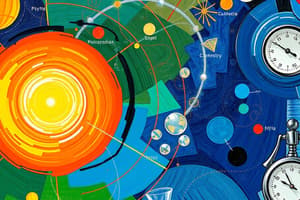Podcast
Questions and Answers
What is the scientific method based on?
What is the scientific method based on?
- Belief, tradition, and anecdotal evidence
- Superstition, intuition, and guesswork
- Observation, hypothesis formulation, and experimentation (correct)
- Imagination, creativity, and speculation
During which period did the Scientific Revolution take place?
During which period did the Scientific Revolution take place?
- 5th - 8th centuries
- 17th - 19th centuries
- 14th - 17th centuries (correct)
- 9th - 12th centuries
Who were key figures in the Scientific Revolution that challenged established beliefs?
Who were key figures in the Scientific Revolution that challenged established beliefs?
- Aristotle and Plato
- Nicolaus Copernicus and Galileo Galilei (correct)
- Isaac Newton and Albert Einstein
- Marie Curie and Charles Darwin
What did the Scientific Revolution establish the importance of?
What did the Scientific Revolution establish the importance of?
What groundbreaking discovery did Gregor Mendel make?
What groundbreaking discovery did Gregor Mendel make?
Which scientific theory challenged the geocentric model?
Which scientific theory challenged the geocentric model?
How has science impacted society in terms of technological advancements?
How has science impacted society in terms of technological advancements?
What role does science play in addressing global challenges?
What role does science play in addressing global challenges?
How does science contribute to improving quality of life?
How does science contribute to improving quality of life?
What is one way science fosters critical thinking in society?
What is one way science fosters critical thinking in society?
Flashcards are hidden until you start studying
Study Notes
Unraveling the World of Science: A Comprehensive Overview
Science, the systematic study of the structure, behavior, and origin of the physical world, has been a cornerstone of human achievement and discovery since ancient times. Embarking on an exploration of this multifaceted discipline, we'll delve into its various aspects, from its groundbreaking discoveries to its wide-ranging implications.
The Scientific Method
The scientific method, a systematic approach to understanding the natural world, is based on observation, hypothesis formulation, and experimentation. This systematic process allows us to test scientific theories, refine our understanding, and predict new outcomes. By following the scientific method, researchers can achieve reliable results and contribute to the growth of scientific knowledge.
The Scientific Revolution
The Scientific Revolution, a period of intellectual transformation between the 14th and 17th centuries, initiated a profound shift in our understanding of the natural world. Key figures such as Galileo Galilei, Nicolaus Copernicus, and Sir Francis Bacon challenged established beliefs and urged for empirical evidence to support scientific claims. The Scientific Revolution laid the groundwork for modern scientific thought and established the importance of critical reasoning and evidence-based claims.
Scientific Discoveries
Throughout history, science has made numerous groundbreaking discoveries that have transformed our understanding of the natural world. Some of these include:
- Gregor Mendel's work on genetics: His laws of inheritance helped lay the foundation for today's understanding of genetics and evolution.
- Copernicus' heliocentric model: His theory that the sun, not the earth, is at the center of the solar system challenged the traditional geocentric model.
- Einstein's theory of relativity: His theory revolutionized our understanding of space, time, and gravitation.
- Penicillin: Alexander Fleming's discovery of penicillin in 1928 led to the development of antibiotics, saving countless lives.
The Impact of Science
Science has had profound implications on society and has led to numerous advancements in technology, medicine, and everyday life. Some of these advancements include:
- Medical advancements: Science has led to numerous medical breakthroughs, including the development of antibiotics, vaccines, and pharmaceuticals.
- Technological advancements: Science has enabled numerous technological advancements, including the internet, mobile phones, and artificial intelligence.
- Environmental stewardship: Science has helped us understand the impact of human activity on the environment and has led to the development of strategies to tackle climate change and pollution.
- Space exploration: Science has enabled numerous advancements in space exploration, including the development of spacecraft, satellites, and other technologies.
The Role of Science in Society
Science is an essential tool for societies to address the complex challenges of the 21st century. By fostering critical thinking and evidence-based reasoning, science helps us make informed decisions about the world. Moreover, science allows us to:
- Understand the natural world: Science enables us to interpret the natural world, helping us predict and control natural phenomena.
- Improve our quality of life: Science has led to numerous advancements in medicine, technology, and everyday life, improving our quality of life.
- Address global challenges: Science helps us address complex global challenges, including climate change, pollution, and poverty.
In conclusion, science is a vital discipline that has shaped the course of human history and continues to influence our understanding of the natural world. By fostering critical thinking and evidence-based reasoning, science helps us make informed decisions and address the complex challenges of the 21st century.
Studying That Suits You
Use AI to generate personalized quizzes and flashcards to suit your learning preferences.




